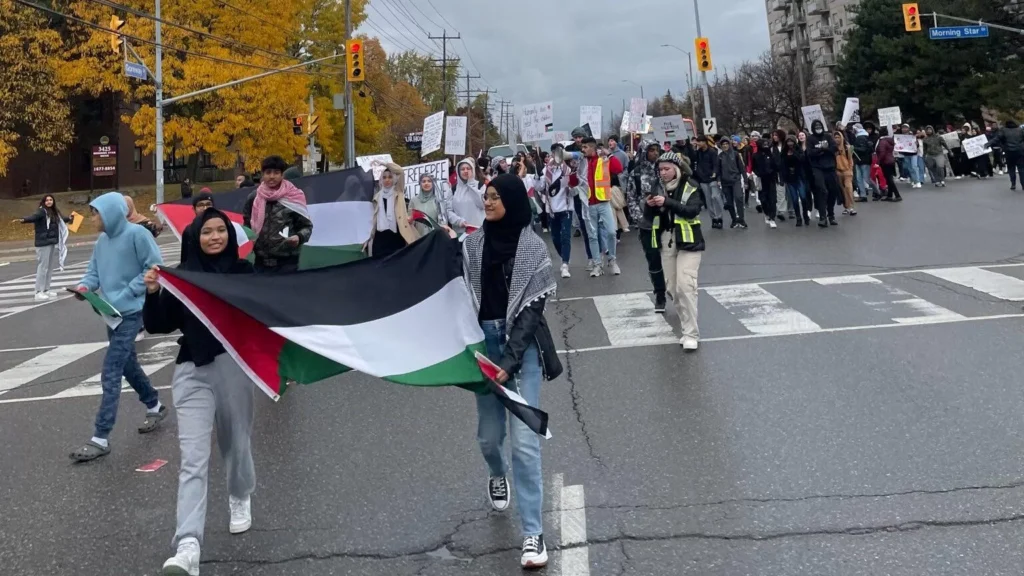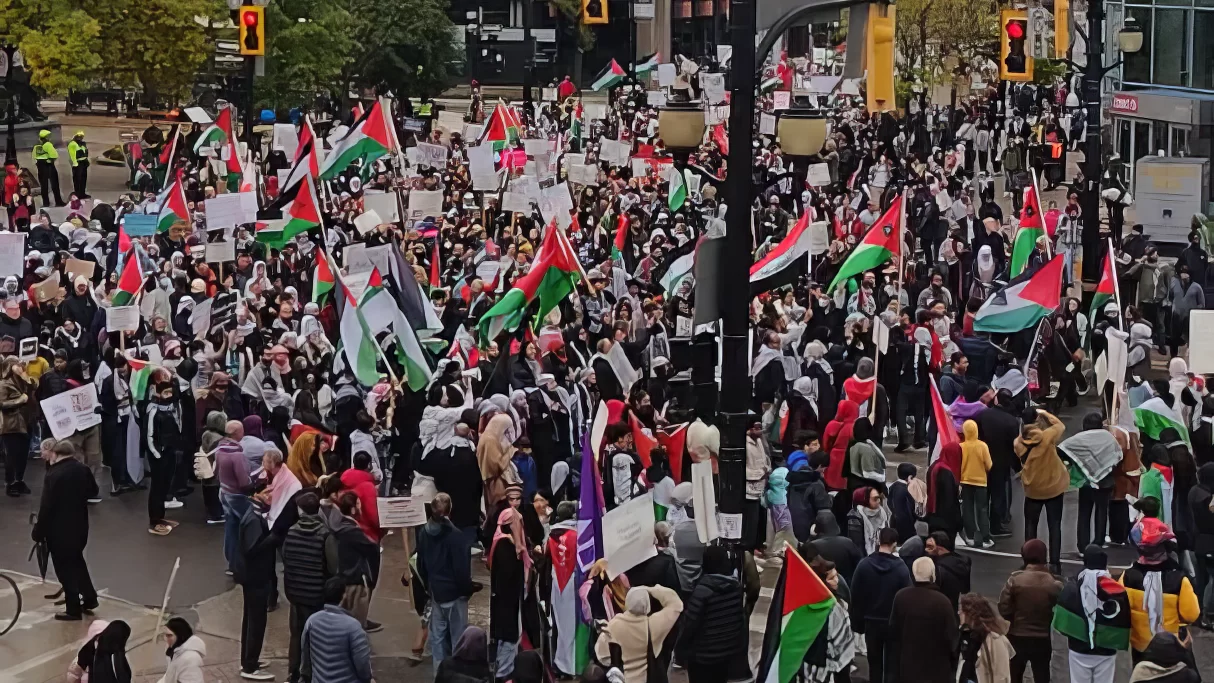On January 11, Toronto police charged Maged Sameh Hilal Al Khalaf with Public Incitement of Hatred for allegedly waving a "terrorist flag" at a Palestinian protest. In a following press conference, Toronto's police chief, Myron Demkiw, stated that the charges are "unprecedented" and acknowledged the usual "high threshold" for the offence.
"Well, I wouldn't exactly call it unusual," says Ethan Quan to North Star, a student at the Bora Laskin Faculty of Law in Thunder Bay. "It’s more the facts and circumstances of the charges that are the abnormality.”
In Canada, almost all previous trial cases were against neo-Nazism. “We have a breadth of case law showing that these charges are meant to deal with real cases of hate, swastikas, Nazism, burning crosses on racialized people's front lawns, for example, so yeah, the law does exist for a reason.”
But Quan says Al Khalaf's case this case is different. “Anytime a flag came up with a similar charge, it was always with a Nazi flag, so that’s where the abnormality comes from."
Al Khalaf is alleged to have waved the flag of the Popular Front for the Liberation of Palestine (PFLP) at a protest. The PFLP is a revolutionary Marxist group formed in 1967 with the goals of obtaining recognition of a Palestinian state, and the right to return home for Palestinian refugees first displaced in the 1948 ethnic cleansing, also known as the Nakba.

So why do the charges come now? There is some speculation that Prime Minister Justin Trudeau may have influenced the decision to crack down on Palestinian protests in the city. Trudeau had met with Chief Demkiw in Toronto on January 10, a day later the Toronto Police announced protests at the Avenue Road overpass were banned.
The 401 overpass was being used for recurring demonstrations for several weeks before the banning. The Toronto police stated the ban is to protect the Jewish community members in the area who have been intimidated. Indeed, Canada has faced an increasing amount of anti-Semitic actssince October 7th, including assaults and arson in Toronto.
However, the decision to ban Palestinian protest at the overpass is concerning to some. Noa Mendelsohn Aviv, executive director of the Canadian Civil Liberties Association, told the Canadian Press that the police’s “absolute” ban on protests in the area was worrying. Reports of backlash against public Palestinian support have flared since November.
North Star recently reported on college instructor Natalie Knight being fired for speaking at a Palestinian demonstration. On February 6, the Toronto Star reported they had obtained a letter in which several Canadian MPs asked universities how they are ensuring students rights are protected for expressing their views on Palestine.
Already last November, more than 700 legal professionals in Canada signed an open letter because of "deeply concerning" reports that lawyers and law students are facing backlash for voicing support for Palestinians. The letter expressed concern of a "new McCarthyism" that will have "chilling effects on freedom of speech."
"They are trying to intimidate and stop the growing support," says Hanna Kawas to North Star. Kawas is the founder and chairperson of the Canada Palestine Association, and emigrated from Palestine to Canada in the 1970s. "I’ve never seen such support in Canada for the last 50 years, its amazing."
“You know most, if not all, Palestinian groups are already on the [terrorist] list,” Kawas says. “If you defend your rights, you are a terrorist. Even Nelson Mandela was on the list." The former South African president wasn't taken off the terrorist list until 2008, after originally being added in the 1980s during the fight against apartheid rule in South Africa.
Beginning in the 1960s, Mandela and the political party, the African National Congress (ANC) led a militant revolutionary fight against apartheid. Despite being labelled a terrorist group at the time, the South African's fight against apartheid is now seen as an important historical event.
“All the support, it's amazing," says Kawas. Despite the wider crackdown against public Palestinian support, Kawas says that he is actually feeling pretty hopeful right now. "There is much hope right now! Look at what happened in South Africa, look at their history.”
- Trudeau calls for a “humanitarian pause” in Gaza
- Teacher denounces TDSB’s silencing of support for First Nation and Palestine
- Inside the Student Encampments Challenging University Investments in Israel
- B.C. civil liberties group denounces state attack on free speech
- Government of Canada Labels Palestine Solidarity Organization As a Terrorist Entity
- Authors Demand Giller Prize Sever Partnership With Scotiabank
- Understanding the root causes of recent violence
- New groups are changing the face of the Palestinian movement
- Scotia Bank benefits from weapons “battle-tested on Palestinians, Lebanese and Syrians”
- Flag-flying protestor charged with hate crime
- How did adopting a controversial definition of antisemitism become a priority?
- “Palestine is in our hearts”
- Canada-wide solidarity with civilians affected by the conflict
- Workers Refuse to Handle Weapons for Israel
- High School Students Walking Out for Palestine All Across Ontario
- The Critical Role of Prisoners
- A conditional freedom of expression?
- Canadian pension funds exploited to finance violence in Palestine
- ICJ Rules on Gaza Genocide, But Can It Make a Difference?


